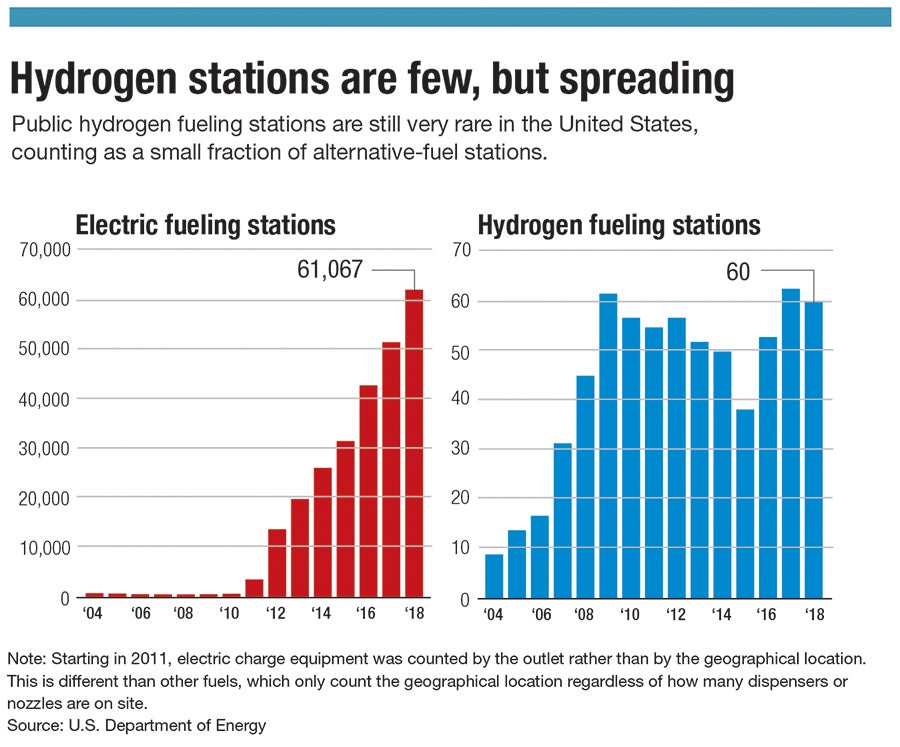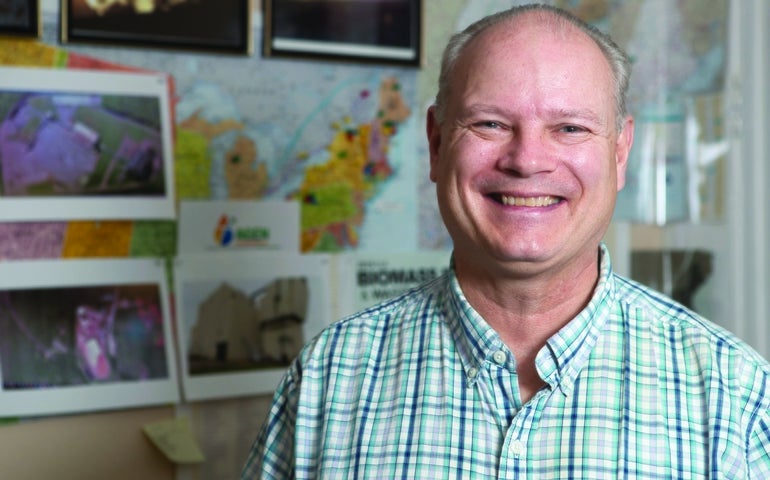A certain fuel can power vehicles without the harmful emissions of gasoline or diesel, and with a longer range and far quicker fill-up time than battery-powered electric cars.
Hydrogen, or fuel cell, vehicles might be the next big thing to wean drivers off greenhouse gas-emitting vehicles.
Holliston’s Agen Environmental wants to be a major player to help get there. The startup wants to add hydrogen fueling stations across the area and create hydrogen from clean sources, unlike what it says the process is typically like in creating the fuel.
Agen’s president, Eric LaVoie, isn’t talking about a timeline too much in the future, either.
“We’re probably six months out, eight months out,” LaVoie says of adding hydrogen fueling stations in Massachusetts.
Hydrogen power still has a long way to go before its nearly as ubiquitous as even electric-car charging stations, never mind gasoline.
The U.S. Department of Energy lists no public-use hydrogen fueling in the United States outside of California, where there are less than 50; and 2,300 hydrogen vehicles were sold in the U.S. last year, according to the industry website insideevs.com.
Even compared to plug-in electric cars, with the likes of the Toyota Prius, fuel cell cars are very hard to come by. Plug-in cars outsold their hydrogen counterparts 157 to 1, according to insideevs.com.
“They key to hydrogen fuel is, ‘Can you do this effectively?’” said Greg Sirokman, a chemistry professor at Wentworth Institute of Technology in Boston.
Jumping on the trend early
Hydrogen fueling stations can’t be added too simply, and transporting, storing and filling a vehicle with a gaseous substance instead of a fuel are all hurdles to more widespread use of fuel cell vehicles.
LaVoie and Agen Environmental aren’t looking at the market today in Massachusetts, but at what advancements and demand and other areas indicate could soon come here.
Hydrogen is very plentiful – after all, it’s a major component of water – but it is often made by burning natural gas or even coal. Agen wants to make hydrogen through means that don’t emit pollutants like those methods do.
The company is in the process of buying two biomass plants in upstate New York using wood or other plant material to create hydrogen. Owning those plants gives Agen lower production costs than competitors, LaVoie said.
Agen, which was launched in 2017, plans to have those plants fully operational by next February.
LaVoie may face long odds in getting hydrogen stations across the area to change the type of vehicles we drive soon, but he sees more potential in fuel cell vehicles than anything else, particularly for trucking.
“Hydrogen is probably more formidable to replace diesel in the industry than anything,” he said. “Diesel is dirty.”

Agen plans to manufacture hydrogen fuel cells in Massachusetts, and hopes to create hydrogen it can sell to industrial distributors, a sector of the industry where it could grow if passenger cars are slow to grow here. LaVoie isn’t deterred from a low level of public awareness at this point.
“A lot of people don’t know we even exist,” he said.
Hydrogen hitting the road
To anyone driving or riding in a hydrogen vehicle, a few things are instantly apparent. For one, the vehicle is virtually silent – like an electric vehicle – running not on a combustion engine but on a series of batteries with virtually no moving parts. Unlike liquid gasoline, filling a vehicle with hydrogen means filling with gaseous vapors. The only emission is water.
Technological advancements have dropped prices of hydrogen and made it more feasible to store hydrogen for fueling stations.
“All of that has only come together recently,” said Pratap Rao, a mechanical engineering professor at Worcester Polytechnic Institute.
Passenger vehicles have come to the market only in recent years, with carmakers creating new vehicles to be filled in just around five minutes with ranges of 300 miles or more. Fast-filling times and longer ranges are both benefits compared to battery-powered electric cars.
Hyundai – which said last year it wants to produce 700,000 hydrogen vehicles annually by 2030 – sells the sport-utility Nexo. Toyota and Honda sell hydrogen sedans, while General Motors, Volkswagen and others have hydrogen vehicles in production.
Those vehicles can’t be bought in this area, though. Honda and Hyundai sell their vehicles only in California, and Toyota’s can be bought only in California and Hawaii.
While the industry hasn’t come to Massachusetts in a mainstream way yet, it has made better inroads in California, Europe and parts of Asia.
London announced in May, for example, its iconic double-decker buses will soon run on hydrogen, and Germany began running a hydrogen-powered train last fall. South Korea said last year it plans to invest more than $2 billion to support hydrogen-powered transit system buses, a network of fueling stations, and research. Bloomberg reported in May that Chinese transit systems now run 421,000 hydrogen buses.
Agen Environmental wants to be ready for what it says is the inevitable expansion into the Northeast Corridor.
“When it comes to the Northeast, Agen will be front and center,” LaVoie said.
Adoption elsewhere
Even if few passenger vehicles run on hydrogen today, commercial firms are increasingly using it for buses and trucks.
Nikola Motor Co, a major player in the hydrogen and clean-energy trucking industry, is building a hydrogen truck plant in Arizona after getting a backlog in orders of 13,000 hydrogen vehicles. The company says it plans 700 hydrogen truck fueling stations by 2028.
Anheuser-Busch said last year it’s ordering 800 hydrogen trucks, and the shipping company DHL said in May it’ll order 100 trucks by next year. Both Amazon and Walmart have worked with the New York firm Plug Power to install hydrogen technology in their warehouses.
The Federal Transit Administration is supporting the industry through $55 million in grants each year to state and local governments to use zero-emission or low-emission buses, including hydrogen.
The Massachusetts Clean Energy Center has given $586,000 in grants to four companies to help develop hydrogen fueling technology, including to Ivys Energy Solutions of Waltham to build a dual hydrogen and battery electric car charging station.
The MBTA began testing a hydrogen-fueled bus in 2016, but it’s no longer in service. There aren’t any plans to begin using a hydrogen fleet, the transit agency said.

Some private-industry companies in Massachusetts have switched over to hydrogen vehicles, according to the U.S. Department of Energy, including the distributing company Sysco, which uses hydrogen for 230 of its forklifts, and Martignetti Companies, a wine and spirits distributor using the fuel for 39 forklifts.
Nationally, major corporations are now using stationary hydrogen power systems for primary and backup power, according to the Fuel Cell & Hydrogen Energy Association, including Apple, eBay, Google and Microsoft.
Sirokman said wider adoption of hydrogen isn’t a matter of technology or prices.
“It’s a matter of political will,” he said, portraying the issue as a question of whether society will choose to invest in a cleaner energy. “The cost is not the prohibitive part.”

